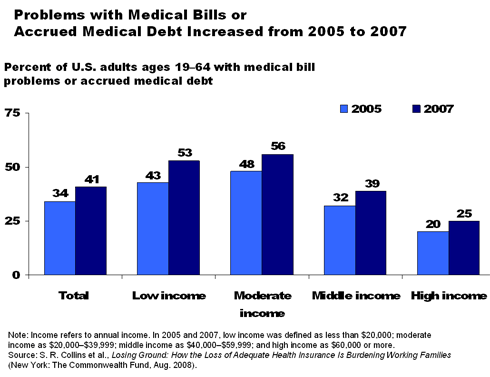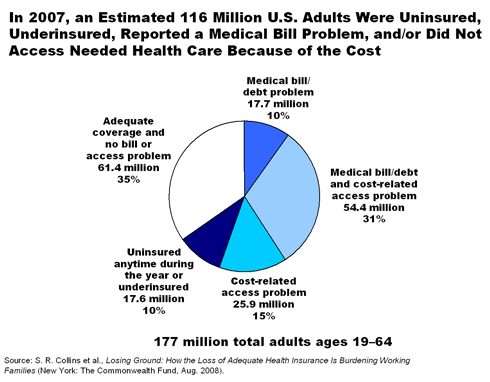American families are confronting harsh financial realities of late, from rising unemployment and sluggish wage growth to high food and fuel costs and tight credit. Added to these worries are soaring health care costs, and the severe erosion of adequate health coverage.
A recent survey from The Commonwealth Fund finds that many people are struggling to pay their medical bills and have accumulated medical debt over time. In fact, 41 percent of working-age Americans—or 72 million people—have medical bill problems or are paying off medical debt, up from 34 percent in 2005. If you add in the 7 million elderly adults who are also dealing with these issues, a total of 79 million Americans have medical bill or debt problems.
As reported in Losing Ground: How the Loss of Adequate Health Insurance Is Burdening Working Families, problems accessing and affording needed care are widespread. Nearly two-thirds of U.S. adults under age 65, or 116 million people, had medical bill problems or debt, went without needed care because of the cost, were uninsured for a time, or were underinsured—that is, whatever coverage they had was not providing adequate protection from high medical expenses.

"We are seeing a perfect storm of negative economic trends threatening working families in the United States," said Sara Collins, Ph.D., the study's lead author and an assistant vice president at The Commonwealth Fund. "While gas and food prices are increasing and home values are declining, the rise in health care costs is surpassing income growth and fewer people have adequate insurance. As a result, working people are struggling to pay their bills and accruing medical debt."
While these difficulties are rising across income brackets, families with low to moderate income appear to be burdened the most. The report finds that more than half of working-age adults earning less than $40,000 a year reported problems paying medical bills or being in debt from medical expenses. Medical bill problems included not being able to pay bills, being contacted by a collection agency about an unpaid bill, and changing one's way of life in order to pay medical bills.

Uninsured and underinsured adults are more at risk of having medical bill problems and medical debt than those with adequate insurance coverage, according to Seeing Red: The Growing Problem of Medical Debt and Bills, a companion to the survey report also released by the Fund. Three of five adults who are uninsured or underinsured face these challenges, more than double the rate of those who had adequate insurance all year (26%). Because they are covered by Medicare and often also have Medicaid or supplemental private coverage, Americans age 65 and older are far less likely to have medical bill problems or debt than younger adults. Just 19 percent of adults over 65—half the rate for adults under 65 (41%)—reported any medical bill problems or debt.
Commenting on the survey findings, Commonwealth Fund president Karen Davis said the current economic crisis "makes it even more urgent for the new administration to make universal and affordable health insurance a high priority in 2009, to ensure that no American suffers financial hardship as a result of serious illness."